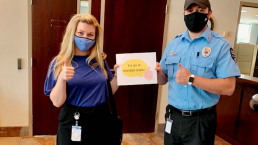Declaration of International Non-Violence Day
Every year, the International Day of Non-Violence is observed on October 2, the birthday of Mahatma Gandhi. According to the UN General Assembly resolution of June 15 2007, this day was established to promote a “culture of peace” in commemoration of Gandhi’s contribution to non-violent resistance. Gandhi responded to violent forms of colonialism with non-violent resistance; he neither reciprocated violence with violence, nor responded to abusive words with abusive words. Instead, he thought that words and writings were essential to spread the concept of non-violence.
ASEZ Conducted "No Verbal Abuse" Campaign
When you spit out words carelessly, it can change someone’s life or leave an indelible wound.
That is why words are more powerful than a sword.
13,493 people from 81 countries took part in the ASEZ “No Verbal Abuse” Campaign for ten days from October 2 2020.
People sent encouraging words or gestures online and offline every day to their close acquaintances and to others who may go through difficult times, and posted a screenshot as proof.
"Traces of malicious comments . . ."
We live with words.
We speak and listen to words from morning to evening.
Online comments make up a part of those words.
When using the Internet, you might have seen malicious comments before.
Most people who leave malicious comments might be ignorant to the effects of their comments.
However, the effect of such comments does not disappear; it can change a person’s day or even determine someone’s life.
Some participants of the campaign said, “If I receive malicious comments, I would not feel normal,” “The level of violence is too high,” ”They offend me even when I am not involved.”
"I support you."
Encouraging words have the power to stop all violence in the world.
ASEZ launched the “No More Verbal Abuse” Campaign by posting positive responses.
“Don’t give up, I support you.”
“Everything will go well.”
Just as a malicious comment spawns another malicious comment, the trace of positive responses creates a virtuous circle.
Positive comments brought about more positive responses, one after another.
One participant shared tips for posting positive responses, saying, “To make good replies, I try to understand the other person first. It is not always easy to understand, however, it is necessary to comfort someone with sincerity, and it helps a lot.”
“I realized words can be a useful tool to get through the current situation, and a cheerful word may give power to overcome difficulties,” said another participant, speaking on the power of words through this campaign.
Expressing Feelings with Words: You Are an Important Person
We are with our family, friends, and co-workers every day.
At times, we take for granted their appreciation and love.
Through this campaign, we expressed our love to our precious ones.
When we expressed our feelings by sending text messages and letters, and calling and conversing with them which we usually couldn’t do because we felt shy and awkward, it improved our relationships with them; positive words returned with positive power.
Everyone heard what they wanted to hear from their loved ones.
At first, participants wondered if words could really change things, but they later unanimously agreed to continue expressing their sincere appreciation to their loved ones even after the campaign had ended, knowing how positive words led to better relationships. Participants would continue to use words their loved ones want to hear and the words that enlighten them to the fact that they are precious.
Without expressing, they can deliver nothing.
Words Can Contain Everything
The “No More Verbal Abuse” Campaign for the International Day of Non-Violence showed us how powerful words can be.
It awakened us to how much verbal abuse prevails in our daily life, and how serious it is.
Mahatma Gandhi resisted against violence with non-violence, showing that non-violence is more powerful.
Now that everyone is going through this difficult time without exception, we can build our future by communicating to others with words.
We can heal wounds made by words, by the power of words.
Encouraging words for one another have the power to overcome difficulties.
RELATED POSTS
[Global Issue] Ending Plastic Pollution
2024-10-30
[Global Issue] Great Green Wall
2024-09-27
[Global Issue] RED LIST
2024-08-30





























